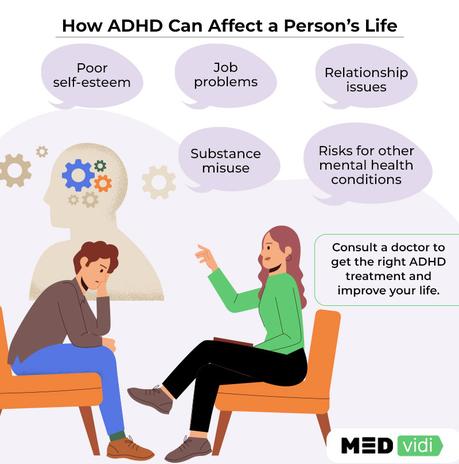Untreated ADHD in Adults
- 7 November, 22
 ADHD
Signs and Negative Effects of Untreated ADHD in Adults
ADHD
Signs and Negative Effects of Untreated ADHD in Adults
Attention deficit hyperactivity disorder (ADHD) can last into adulthood if untreated or undiagnosed. Many times, even after the diagnosis, people fail to see the importance of receiving treatment. They are unaware of the detrimental effects that untreated ADHD has on an adult’s life, though.
Before going into the specifics of how untreated ADHD in adults would affect them in the long run, it’s critical to understand the indications and symptoms of the disorder. To learn more, keep reading!
ADHD symptoms are manageable. Find out how to live a successful life with ADHD by getting professional help.
Consult A Doctor OnlineSymptoms of ADHD in Adults
Understanding the signs of ADHD is crucial for receiving the correct help. Inattentiveness and hyperactivity are the two subcategories of ADHD that are most commonly known. More specific symptoms that occur, though, besides these two groups are as follows:
- Disorganization
- Difficulty multitasking
- Trouble in relationships(romantic or platonic)
- Forgetfulness
- Anger
- Difficulty focusing
- Impulsiveness
- Restlessness
- Poor time management
- Emotional instability
- Hyperfocus
- Lack of motivation
The issue is that these symptoms are frequently misclassified as signs of immaturity, depression, or anxiety. Being misdiagnosed or underdiagnosed results in undertreatment because people with ADHD frequently also have other mental health conditions.
How to Be Diagnosed with ADHD?
Because there is considerable debate if the criteria used to diagnose ADHD in children and teenagers could apply to adults, diagnosing ADHD in adults is more challenging.
If an adult exhibits at least five of the impulsivity, hyperactivity, or inattentiveness mentioned in the DSM-V, they can be diagnosed with ADHD. However, a diagnosis of ADHD in adults cannot be established under the current diagnostic guidelines unless some symptoms have been present since childhood.
Adults are diagnosed with ADHD through assessment tests or screening tests in addition to the DSM criteria. A mental health practitioner uses and evaluates these screening instruments. Additionally, symptoms of ADHD must also moderately impact several areas of an adult’s life, such as performing below expectations at work, having trouble developing or maintaining relationships, and more.
Get an accurate diagnosis of your symptoms from ADHD experts at the MEDvidi online clinic.
Book An AppointmentLong-Term Effects of Untreated ADHD in Adults
If left untreated, the consequences of ADHD can go beyond inattentiveness and impulsivity. Adults who do not obtain treatment for the disorder may experience serious effects. Others who live with them may also be impacted.
Untreated ADHD in adults runs the following risks:
Relationship Issues
Adults with ADHD have elevated levels of emotional dysregulation (low ability to manage emotions). They may have issues such as self-regulation of emotions, impatience, irritation, and anger that are challenging to control. Due to these emotional reactions, relationships suffer and affect the overall mental well-being of the person and the partner.
Poor Self-Esteem
Self-esteem issues are also common in adults with ADHD. However, some findings suggest that females are more prone to struggle with low self-esteem than males. Major psychological distress, such as severe anxiety and depression, is also more likely to affect them.
Job Problems
The workplace presents several difficulties for adults with ADHD, including poor communication skills, distractions, procrastination, and trouble managing difficult tasks. All these can add to work stress and lead to job instability.
See A Doctor Online
Substance Misuse
Adults with ADHD are more likely to become drug dependent due to the wide-ranging effects of the disorder and the stress brought on by its overwhelming symptoms. According to studies, people with ADHD are prone to developing a substance use disorder, as they use this approach to calm their emotions and promote sleep.
Risks for Other Mental Health Conditions
ADHD is frequently comorbid with other mental conditions like any other neurological ailment. The presence of depression, bipolar disorder, or another mood disorder is common in adults with ADHD. It is estimated that more than two-thirds of people with ADHD also have at least one other co-occurring mental illness, such as anxiety or depression.
Increased Mortality
According to several studies, adults having ADHD are marginally at higher risk of dying young, most often from suicide and accidents. However, sustained use of ADHD drugs lowers the possibility of accidents and suicide by a large margin.
Can ADHD Go Away?
ADHD is not completely curable, but it’s manageable. Untreated ADHD in adults can cause functional limitations in various areas of life. However, adult ADHD treatment reduces symptoms and usually results in improved overall well-being. Make an appointment with MEDvidi’s doctor now to learn more about the treatment options that will work best for you.

Real help for ADHD.
Beat your symptoms with our expert advice.





- Attention deficit hyperactivity disorder (ADHD)
- Long-term effects of ADHD
- Signs of untreated ADHD in adults
- Undiagnosed ADHD in adults
- Untreated ADHD in adults symptoms
